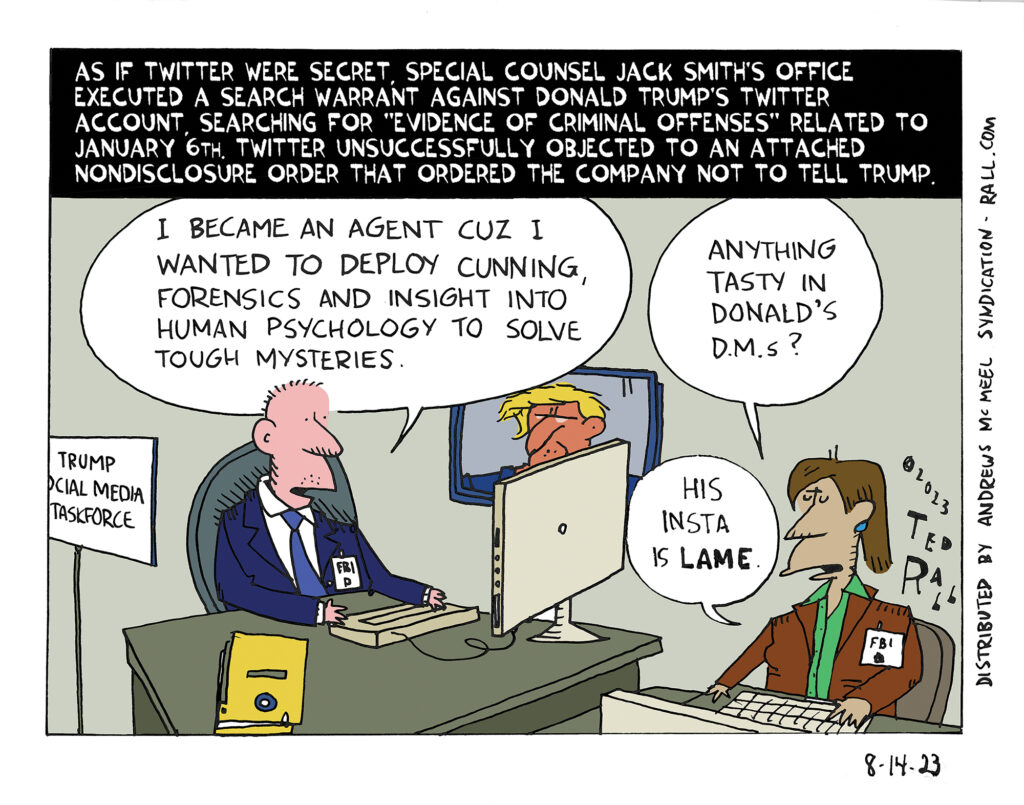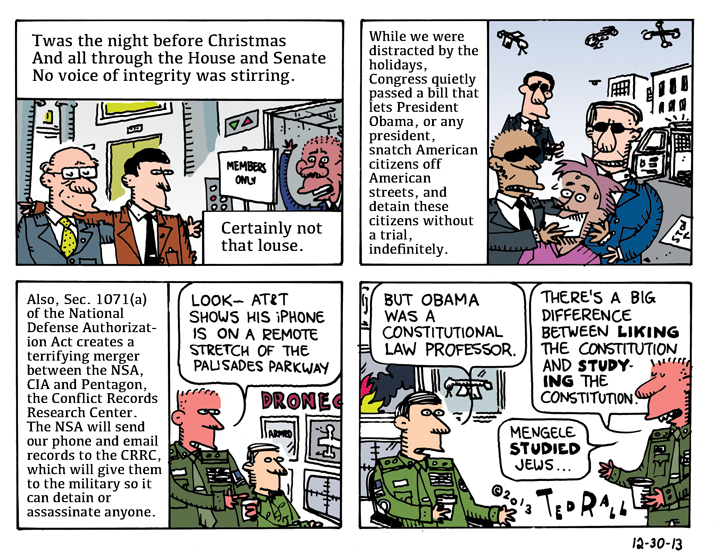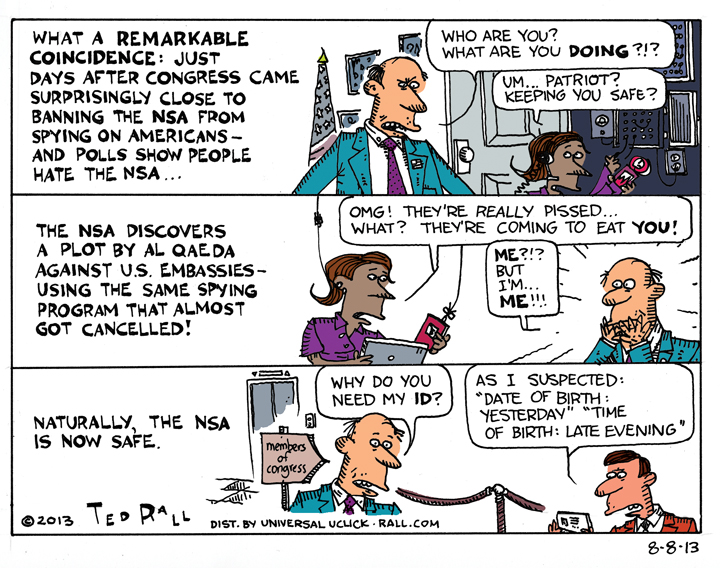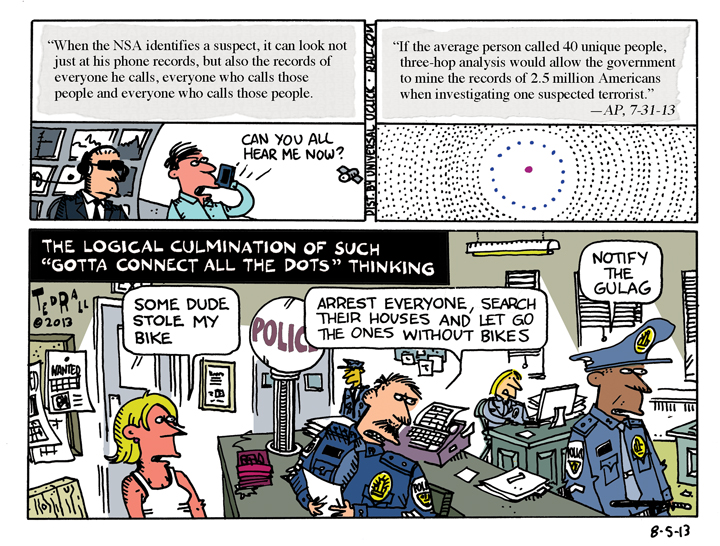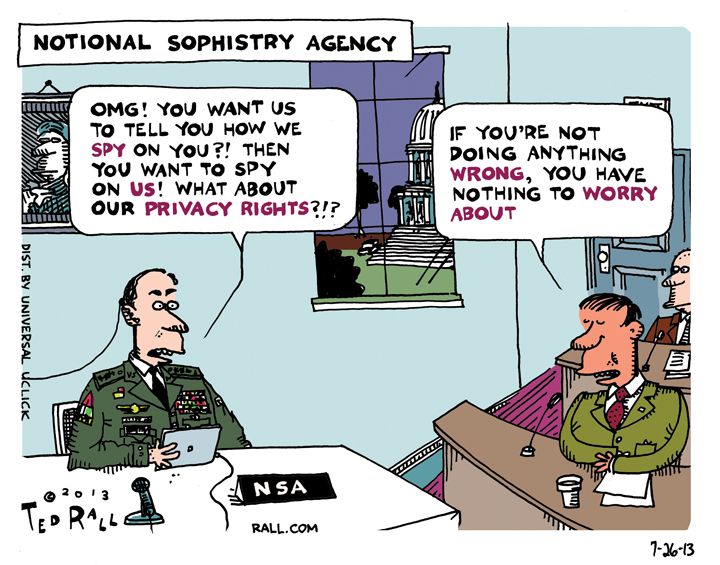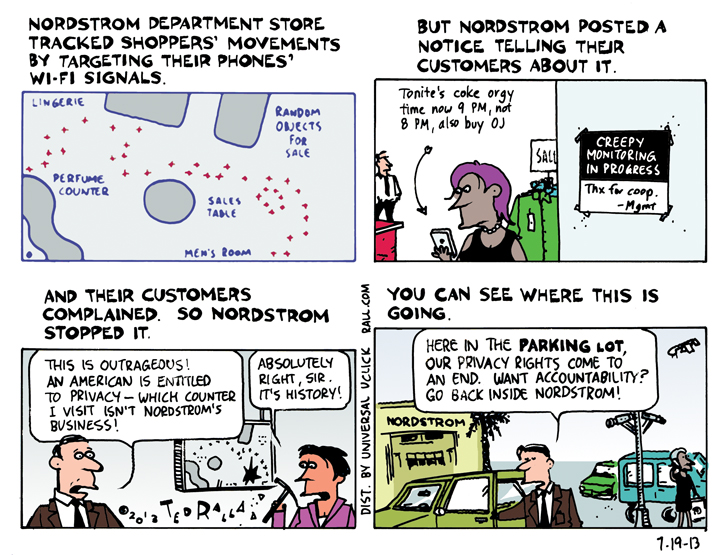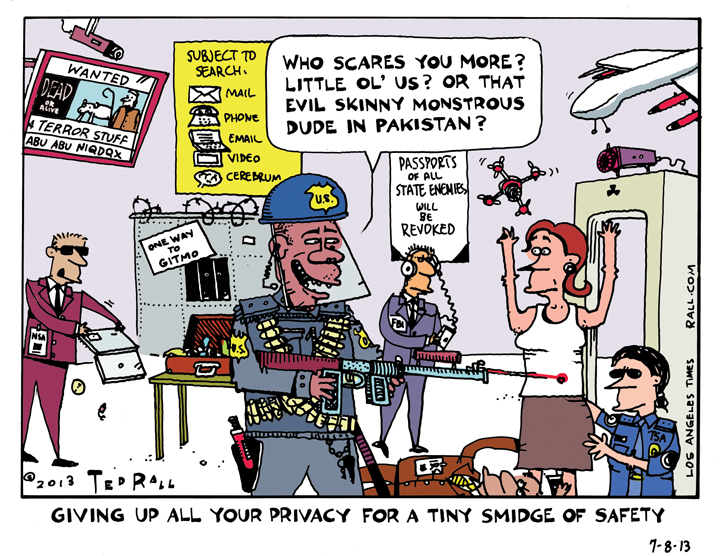As if Twitter were secret, Special Counsel Jack Smith’s office executed a search warrant against Donald Trump’s Twitter account, searching for “evidence of criminal offenses” related to January 6th. Twitter unsuccessfully objected to an attached nondisclosure order that ordered the company not to tell Trump.
Make Text Messages Private

Nearly a decade ago, the Edward Snowden revelations prompted a national debate about data security. Polls show that a growing number of Americans take data-security precautions like choosing different passwords for online accounts and using encrypted communications platforms like Signal. Eight out of 10 people believe companies should be required to obtain direct consent to collect or sell their data.
But there still hasn’t been any meaningful discussion about data privacy. Text messages, particularly one-on-one exchanges as opposed to group chats, feel as intimate as whispers across your pillow. Do you expect your text messages to remain private? I bet you do. Most people do. Why am I so sure? Because so many people mouth off in text messages that get them into trouble.
The law, on the other hand, does not codify the reasonable expectation of privacy to the dispenser of digital diarrhea. Either the sender or the recipient of an SMS may publish it anywhere she likes, including a public forum like social media. And that’s scary. If you’re honest with yourself, there’s probably at least one text in your history that you hope never sees the light of day.
In a high-functioning society, laws and social mores are aligned. It is time to close the yawning gap between our privacy-be-damned laws and Americans who behave, and obviously believe, as though their texts were as private as a verbal chat between friends or lovers.
Crystal Clanton provides a high-profile case in point. Six years ago in late 2015 she was a 20-year-old college senior and an employee of Turning Point USA, an organization that promotes conservative politics on college campuses. According to Jane Mayer at The New Yorker Clanton sent a text message to a fellow Turning Point employee, John Ryan O’Rourke, while the two of them were attending a conference in D.C. “I HATE BLACK PEOPLE” “Like f— them all,” Mayer reported that Clanton wrote, with the expletive spelled out. The context of the leaked conversation suggests that she was reacting to some sort of run-in on the street or in a store.
Clanton was fired by Turning Point after Mayer’s piece about the incident was published in 2017. Now The Washington Post is reporting that Clanton, “a student at the Antonin Scalia Law School at George Mason University, [has been] selected for a coveted clerkship with William H. Pryor Jr., the chief judge of the U.S. Court of Appeals for the 11th Circuit” and “appears well on her way to the ultimate credential for a young lawyer, a Supreme Court clerkship.”
Clanton questioned the authenticity of the dialogue, pointing out — reasonably, in my view — that an easily-manipulated digital screenshot proves nothing. The Post ridiculed that defense and criticized such well-connected Washingtonians as Supreme Court Justice Clarence Thomas for supporting her.
Setting aside issues of evidence, racism and whether one ought to be subjected to career cancellation over a years-old rant, let’s assume that Clanton actually texted those toxic words. Obviously Clanton never assumed that her texts might someday be made public, much less reprinted in a major magazine and discussed in the pages of one of the most prestigious newspapers in the United States. If her smartphone warned before hitting the “send” paper-airplane icon — “You are about to send a public message. Privacy not guaranteed. Are you sure you want to send?”—she might have thought twice. But smartphones are engineered for impulsivity, not second thoughts.
Clanton has company. Police officers in California, North Carolina, and Texas have been fired and/or prosecuted for sending racist texts. An Alabama sorority ousted its chapter president for texting that Black students smelled bad. A quarterback for the Buffalo Bills had to apologize for texting “guns are good” followed by “Just make them very expensive so only elite white people can get them haha.” The term “elite white people” triggered outrage. Elizabeth Holmes, founder of Theranos, was hung on the petard of her texts to former Theranos President and COO Sunny Balwani.
Particularly in the case of the police, people shouldn’t think such things, much less say them. But that’s not the point. Point is, Holmes assumed that her “on route to dentist my king” was private, just between her and Balwani. We don’t live in a surveillance state like East Germany under the Stasi because Americans intuitively understand that having the right to say stupid, insensitive, unpatriotic, even bigoted garbage behind closed doors, in private, with your confidantes—to make mistakes, to be a jerk, to blow off steam, to try scummy name-calling on for size—is an essential part of freedom of speech.
Congress ought to pass a law guaranteeing the confidentiality of text messages unless both parties waive their privacy rights or the communications are relevant to a criminal investigation or lawsuit, in which case they would be subject to subpoena.
Such a reform would not represent a major expansion of privacy rights under American law. If I send you an old-fashioned letter by snail mail, you own the physical letter but I own the copyright of its contents. As per the 1986 case Salinger v. Random House in which the reclusive author sued a biographer to avoid the publication of his personal letters, you might be able to reproduce a small excerpt in your no-doubt incredibly-flattering biography of yours truly. But you will need my express written permission in order to publish my letter in its entirety, or after I die that of my estate. There are exceptions for criminal and civil-court matters such as the use of my letter to defend yourself against any allegations I may have made against you.
A 2010 case, United States v. Warshak, expanded the reasonable expectation of privacy to email communications. Federal law and those of 11 states, including such populous jurisdictions as California and Florida, bans the recording of phone conversations without the consent of the other party.
Unfortunately, the U.S. Supreme Court has not yet weighed in on the issue of privacy expectations concerning Americans’ text messages. And rationality has been in short supply in lower court rulings. “Any purported expectation of privacy in sent text messages of this type is significantly undermined by the ease with which these messages can be shared with others,” Massachusetts Supreme Judicial Court Justice Frank Gaziano wrote last year in a ruling against implied privacy rights for texts. By Gaziano’s reasoning, the ability to photocopy or cut-and-paste should also abolish privacy expectations for letters and emails.
Americans who text only to later find themselves exposed to public ridicule or worse clearly expect their messages to remain private. If their expectation is unreasonable, it’s incumbent upon telecommunications companies to tell their customers that everything they say can and will be used against them in the court of Twitter.
(Ted Rall (Twitter: @tedrall), the political cartoonist, columnist and graphic novelist, co-hosts the weekly DMZ America podcast with conservative fellow cartoonist Scott Stantis. You can support Ted’s hard-hitting political cartoons and columns and see his work first by sponsoring his work on Patreon.)
Studied the Constitution. Didn’t Like It.
While Americans were distracted over Christmas, Congress and Obama quietly passed the National Defense Authorization Act, which beefs up the President’s right to put anyone, including US citizens, on a Kill List or hold them indefinitely without trial or representation by a lawyer. There’s even a new unit to funnel NSA spy data to the Pentagon so it can target US citizens.
SYNDICATED COLUMN: Is Rand Paul America’s #1 Liberal?
Libertarians Replace Democrats as Warriors Against Crazy Presidents
There once was a time (before the 1980s) when liberals were a powerful force against executive overreach. Democrats like George McGovern opposed wars of choice. Democrats like Frank Church exposed the CIA, which led to an executive order (by President Ronald Reagan!) that banned political assassinations. A Democratic Congress held impeachment hearings against Richard Nixon, in part because he violated the privacy rights of a few hundred Americans by tapping their phones. Millions of lefties marched against the Vietnam War — it didn’t matter that the president was a Democrat.
Things have changed.
A “liberal” president and his Democratic congressional and media allies aren’t fighting the good fight. They’re committing the worst crimes.
And so, following what Chris Hedges called “the death of the liberal class,” where the Hellfire missiles fly and in streets that ought to be full of protesters, naught but crickets, here’s what’s left:
The most liberal politician in America is a right-winger.
Rand Paul, who in May led a 13-hour filibuster in the Senate over Obama’s drone war, is the mainstream’s point man against dystopian killer air robots. This is the kind of thing that, had even a Democratic president like LBJ had been up to, would have had Democrats and the liberal media up in arms.
Even though an out-of-control White House is leaving open the option of using drones to blow up Americans on American soil (not that it’s OK in Pakistan), Democrats are nowhere to be found. At least 4,000 people — by law, all innocent since none were charged by a court — have been assassinated under Obama’s orders. Meanwhile, liberal politicians sit on their hands. Progressive media outlets scarcely mention these horrors, and when they do it’s in tepid tones that rarely call out Obama as the blood-soaked mass murderer he is.
Is Rand Paul so far right that, like Pat Buchanan back when, he comes all the way around the back to the left? Are Paul’s maverick stances just a marketing program to draw attention to himself, in preparation for 2016? Or is his brand of libertarianism genuine? Whatever the motivation, Paul has become the most, perhaps the only, establishment political figure expressing a progressive vision on a host of incredibly important issues…issues that have been abandoned by the state-sanctioned Left.
Paul, a right-wing Republican who believes Israel can do no wrong, is nevertheless he establishment’s most passionate defender of privacy rights. The libertarian scion has sponsored a bill that would prohibit the NSA from intercepting and storing Americans’ phone records. (Because the NSA charter limits its activities to foreign intelligence gathering, the phone tapping and other Orwellian programs revealed by Edward Snowden are illegal. The bill would ban the phone intercepts explicitly.)
Only four senators are backing this progressive legislation. Paul is the only Republican; most Democrats continue to defend Obama and his NSA, whose totalitarian approach to stealing our information — they take it all — makes East Germany’s “Lives of Others” Stasi look like nosy neighbors. Paul, a free-market purist, wants to overturn the vile Patriot Act, get rid of the useless TSA (“The American people shouldn’t be subjected to harassment, groping, and other public humiliation simply to board an airplane”), and states openly that proposals for Congressional oversight of the NSA — typical, lame sops to public disgust, and Congress was supposed to be doing that all along, weren’t they? — won’t be enough.
“The Constitution doesn’t allow for a single warrant to get a billion phone records,” says the senator from Kentucky. “They basically, I believe, are looking at all of the cell phone calls in America every day.”
The most liberal Democrats in the Senate? They’re collaborators with Obama’s Gestapo.
Dick Durbin sporadically issues some pretty, progressive-esque, pro-privacy noises about reining in the NSA, yet voted to renew the Patriot Act, which captures Americans but not terrorists. Al Franken is pro-fascist security state. “I can assure you that this isn’t about spying on the American people,” Franken said. Actually, that’s exactly what it’s about.
When George W. Bush was in power, “liberal” California senators Barbara Boxer and Dianne Feinstein railed against NSA spying on Americans, calling it an impeachable offense. Now that the president is a member of their party, Boxer is silent and Feinstein is the NSA’s PR flack.
On a lot of issues, Rand Paul’s stances are contemptible. Exhibit A: He opposed the Civil Rights Act as a violation of “state’s rights,” the clarion call of the segregationist Old South. Yet on many of the existential questions of our time, radical policies that have transformed the United States from a democratic republic to a terrifying authoritarian state that uses brute force to subjugate a vast global empire, Rand is on the side of the angels — far more so than the self-defined progressives who claim to value civil liberties while running interference for the insular, violent and repressive Obama Administration.
Rand stood tall against Obama’s fascist National Defense Authorization Act, which allows the federal government to kidnap U.S. citizens and throw them into prison forever without charging them with any crime. “His signature [on the NDAA] means indefinite detention without charge or trial, as well as the illegal military commissions, will be extended,” said Anthony Romero of the ACLU of Obama.
Naturally, the Republican establishment is pissed off at Paul.
GOP columnist Charles Krauthammer slammed Paul as “politically radical” and “socially liberal.” (No comment on whether spying on every American, or assassinating innocent civilians, is “radical.”) Chris Christie, a top 2016 presidential contender, calls Paul’s suspicion of endless wars against Middle Eastern countries “dangerous.” (Unlike the wars?) John McCain calls him a “wacko bird” (takes one to know one) for opposing drones.
If you want evidence of the crisis of the two-party system, look no further than the strange new bedfellows of the age of Obama. Even before the Snowden leaks, 70% of Democrats and 77% of Republicans believed the NSA was violating their privacy. Both Democrats and Republicans who felt this way thought the NSA wasn’t justified: 51% and 52%, respectively.
Even in Congress, a “loose alliance of lawmakers” is allied against the leadership of their own parties” on issues like the NSA and Obama’s desire to attack Syria.
Though nascent, the libertarian-left attack against the liberal-conservative establishment is a big deal. This tendency, as Marxists call it, can develop in one of two directions. There might be a dramatic political realignment such as 1932, when FDR’s New Deal began to move African-Americans and white Southerners into the Democratic camp. Or — I think this is more likely — newly exposed fissures will open, showing that the real split is between oppressed and oppressor, not “liberal” Democrat and “conservative” Republican.
(Ted Rall’s website is tedrall.com. Go there to join the Ted Rall Subscription Service and receive all of Ted’s cartoons and columns by email.)
COPYRIGHT 2013 TED RALL
SYNDICATED COLUMN: 10 Things You Don’t Know About How the NSA Spies on You
The Least Most Untruthful Analysis of Obama’s Orwellian Dystopia
Glenn Greenwald of The Guardian says “a lot more significant revelations” about America’s colossal Orwellian surveillance state are coming down the pike — courtesy of the thousands of pages of classified documents he obtained from Edward Snowden, the heroic former CIA contractor. That should be fun.
In the meantime, we’ve got a pair of doozies to digest: Verizon’s decision to turn over its the “metadata” — everything about every phone call (except the sound) to the NSA, and the PRISM program, under which the biggest Internet companies (Google, Facebook, Apple, Microsoft, etc., pretty much all the top outfits except Twitter) let the NSA read our emails, see our photos, even watch our Skype chats.
Establishment politicians and their media mouthpieces are spinning faster than a server at the NSA’s new five zettabyte data farm in Utah, doing everything they can to obfuscate in the hope that we’ll forget this whole thing and climb back into our pods in The Matrix.
So let’s get some clarity on what’s really going on with 10 things you probably don’t know about the NSA scandals.
1. PRISM, not Verizon, is the bigger story.
Government-aligned mainstream media outlets like The New York Times and NPR focus more on Verizon because — though what the phone company did was egregious — it’s less indefensible. “Nobody is listening to your telephone calls,” Obama says. (When that’s what passes for reassurance, you’ve got a PR problem.) PRISM, they keep saying, is targeted at “foreigners” so Americans shouldn’t be angry about it. But…
2. PRISM really is directed at Americans.
“Unlike the call data collection program, this program focuses on mining the content of online communication, not just the metadata about them, and is potentially a much greater privacy intrusion,” notes Popular Mechanics.
Director of National Intelligence James Clapper testified to Congress that the NSA does not collect “any type of data at all on millions or hundreds of millions of Americans.” “Not wittingly.” As The New York Times said in an uncharacteristically bold post, this is a lie. Here’s what’s behind the Rumsfeldian logic of what Clapper describes as his “least most untruthful” testimony: “What I was thinking of,” explains Clapper, “is looking at the Dewey Decimal numbers of those books in the metaphorical library. To me the collection of U.S. persons’ data would mean taking the books off the shelf, opening it up and reading it.”
In other words, the NSA collects the search histories, emails, file transfer records and actual live chats of every American. They store them in a data farm. Whenever the NSA wants to look at them, they can. But according to Clapper, this isn’t “collecting.” It’s only “collecting” when they choose to read what they have.
I have bought several books. They’re on my shelf. I haven’t read them yet. Have I “collected” them? Of course.
I don’t want the NSA to read my sexts or look at my dirty pictures. The fact that they may not have gotten around to it yet — but have them sitting on their shelves — doesn’t make me feel better.
3. President Obama should be impeached over this.
Richard Nixon was. Or would have been, if he hadn’t resigned. Obama, his top officials and his political surrogates have repeatedly and knowingly lied to us when they said the NSA didn’t “routinely sweep up information about millions of Americans.” He should go now. So should others who knew about this.
4. PRISM and other NSA spy programs are not approved by courts or by Congress.
White House defenders say the surveillance — which is, remember, a comprehensive vacuuming up of the entire Internet, and of every phone call ever made — has been approved by the legislative and judicial branches, so there’s nothing to worry about. But that isn’t true. The “FISA court” is so secret that, until last week, no one had ever seen a document issued by it. It’s not a real court. It’s a useless rubber stamp panel that literally approves every surveillance request the government asks for. In 2012, that’s 1856 requests and 1856 approvals.
Very few members of Congress were aware of the Verizon or PRISM programs before reading about them in the media. Members of the Senate Intelligence Committee, a few select Friends of Barack, that’s it. That’s not Congressional oversight. Real oversight occurs in full session, in public, on C-SPAN.
5. There is no evidence that NSA spying keeps America safe. And so what if it did?
According to government officials, PRISM saved the New York City subways from being bombed in 2009. Actually, the alleged would-be terrorist was caught by old-fashioned detective work, not data-mining. There is zero evidence that the NSA has saved a single American from being blown up.
But so what if it did? In recent years, between 15 and 17 Americans a year died worldwide from terrorist attacks. You’re as likely to be crushed to death by your television set. It’s sad for the dozen and a half victims, of course. But terrorism is a low, low national priority. Or it should be. Terrorism isn’t enough of a danger to justify taking away the privacy rights of 320 million people.
6. This is not a post-9/11 thing.
We’re being told that PRISM and the latest Patriot Act-approved surveillance state excesses date back to post-9/11 “make us safe at any cost” paranoia. In fact, the NSA has been way up in your business long before that.
Back in December 1998 the French newsweekly Le Nouvel Observateur revealed the existence of a covert partnership between the NSA and 26 U.S. allies. “The power of the network, codenamed ECHELON, is astounding,” the BBC reported in 1999. “Every international telephone call, fax, e-mail, or radio transmission can be listened to by powerful computers capable of voice recognition. They home in on a long list of key words, or patterns of messages. They are looking for evidence of international crime, like terrorism…the system is so widespread all sorts of private communications, often of a sensitive commercial nature, are hoovered up and analyzed.” ECHELON dates back to the 1980s. PRISM picks up where ECHELON left off, adding the Internet to its bag of tricks.
7. Edward Snowden expects to be extradited.
U.S. state media wonders aloud, “puzzled” at whistleblower Snowden’s decision to go to Hong Kong, which routinely extradites criminal suspects to the United States. But Snowden’s explanation is crystal clear. All you have to do is listen. “People who think I made a mistake in picking HK as a location misunderstand my intentions,” he told a local newspaper. “I am not here to hide from justice; I am here to reveal criminality.” Snowden could go to Ecuador, or perhaps Venezuela or Iceland. He’s staying put because he wants to face trial in the U.S. And I doubt he’ll cop a plea when he does. He wants a political hearing so he can put the system on trial. In the meantime, he’ll use the time it’ll take Obama’s legal goons to process the extradition to talk to journalists. To explain himself. To make his case to the public. And, of course, to help shepherd those new revelations Greenwald mentioned.
8. Caught being evil — or collaborating with evil — Google and other tech companies are scared shitless.
And they should be. Consumers and businesses know now that when Big Brother comes calling, Big Tech doesn’t do what they should do — protect their customers’ privacy by calling their lawyers and fighting back. This could hurt their bottom lines. “Other countries will start routing around the U.S. information economy by developing, or even mandating, their own competing services,” speculates Popular Mechanics. Europe, worried about the U.S. exploiting the NSA for industrial espionage, began working on work-around systems that avoid U.S. Internet concerns.
9. 56% of Americans trust the government’s PRISM program, which the government repeatedly lied about. What people don’t know should worry them.
You’re not a terrorist. You don’t hang out with them. So why worry? Because the data collected by the NSA isn’t likely to stay locked up in Utah forever. Data wants to be free — and hackers have already proven they can access the NSA. Some want to sell it to private concerns. To insurance companies, so they can determine whether your buying habits make you a suitable risk. To banks. To security outfits, to run background checks for their clients. To marketers. Mining of Big Data can screw up your life — bad credit, can’t get a job — and you’ll never know what you hit you. Oh, and don’t forget: governments change. Nixon abused the IRS and FBI to attack political opponents. Innocuous census data that collected religious affiliations was used by the Nazis to round up Jews when they came to power.
10. In the long run, the end of privacy will liberate us.
Everyone (who isn’t boring) has a dirty secret. The way things are going, all those secrets will be as out as Dan Savage — and just as happy and self-assured. Blackmail — the nobody-talks-about-real-reason-PRISM-is-creepy — only works if most dirty secrets are hard to come by. But if everyone’s got a nude photo online, if everyone’s sexual deviations are searchable and indexed, the power of shame goes away as quickly as it does at a nudist colony. By the time the surveillance state plays out, we may look back at 2013 as the year when America began to move past Puritanism.
If we’re not in a gulag.
(Ted Rall’s website is tedrall.com. His book “After We Kill You, We Will Welcome You Back As Honored Guests: Unembedded in Afghanistan” will be released in 2014 by Farrar, Straus & Giroux.)
COPYRIGHT 2013 TED RALL

